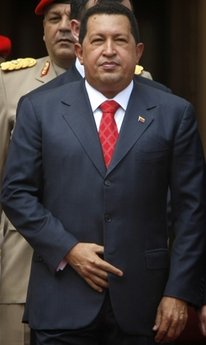Asia-Pacific
Venezuela's Chavez warns Colombia amid tensions
(Agencies)
Updated: 2010-07-24 13:02
 |
Large Medium Small |
CARACAS, Venezuela - Venezuelan President Hugo Chavez warned Colombia against provoking a conflict, saying any attack on his country would trigger a reaction.
 Venezuela's President Hugo Chavez looks on during a welcoming for Abkhazia's President Sergei Bagapsh and South Ossetia's President Eduard Kokoity at Miraflores presidential palace in Caracas, Venezuela, Friday, July 23, 2010. [Agencies] |
"Imagine a war between Colombia and Venezuela. That would be something to cry over for a hundred years," Chavez said. "But you understand that if we are attacked, we aren't going to stay with our arms crossed."
Chavez announced he was breaking off diplomatic relations with the neighboring country on Thursday and placed his military on alert, accusing Colombia's US-allied government of fabricating evidence showing Colombian rebel bases inside Venezuela.
Despite the tensions, cars and pedestrians moved between the countries as usual at border crossings Friday, officials on both sides said. Venezuelan Vice President Elias Jaua called the situation on the border normal.
The diplomatic dispute over the presence of Colombian rebels in Venezuela has worsened just as Colombian President Alvaro Uribe prepares to leave office.
Uribe has frequently feuded with Venezuela's leader, and Colombian officials have long complained, mostly in private, that Chavez has harbored leaders of its two main rebel groups.
President-elect Juan Manuel Santos, however, has stressed the importance of mending trade relations with Venezuela, which overwhelmingly benefit Colombia's food producers. And Chavez has raised the possibility that relations could be restored under Santos.
Trade between Venezuela and Colombia has fallen 70 percent since Chavez froze relations a year ago in response to Colombia's decision to grant the US military expanded access to its military bases. The scaled-back relations have also hurt Venezuelan consumers, as sporadic shortages of items like beef - once imported from Colombia have worsened.
| ||||
Chavez has suggested the photographs presented by Colombia could be bogus. He also has suggested Uribe and the US "empire" could be attempting to provoke a war, and insisted Venezuela does everything possible to prevent members of the Revolutionary Armed Forces of Colombia and the smaller National Liberation Army from crossing into Venezuelan territory.
"We have never supported movements in Colombia in any way, even though we could have. And I'm not referring to the guerrillas," Chavez said Friday night.
He said he thinks the rebels "should reconsider their armed strategy" because they seem to have no chance of toppling the government and also because "they've become the main excuse for the empire to deeply penetrate Colombia."
Chavez has argued in the past that US officials are using Colombia to portray him as a supporter of terrorist groups to justify US military intervention in Venezuela. He warned that any aggression against Venezuela could "become a boomerang against the Yankee empire."
UN Secretary-General Ban Ki-moon expressed hope that Venezuela and Colombia will work out their differences in a peaceful manner.
In Washington, US State Department spokesman P.J. Crowley called the dispute unfortunate and said it was a "petulant response by Venezuela to cut off relations with Colombia."
"Venezuela has clear responsibilities. Colombia has put forward serious charges. They deserve to be investigated," Crowley told reporters.
The European Union, in a statement issued by its ambassadors in Colombia and Venezuela, called for relations to be re-established soon and urged the countries to "abstain from any action that could exacerbate tensions."
Colombian Foreign Minister Jaime Bermudez complained that Venezuela had cut relations without clearly responding to the Colombian government's accusations. He said what's needed is "effective cooperation in the fight against terrorism."


